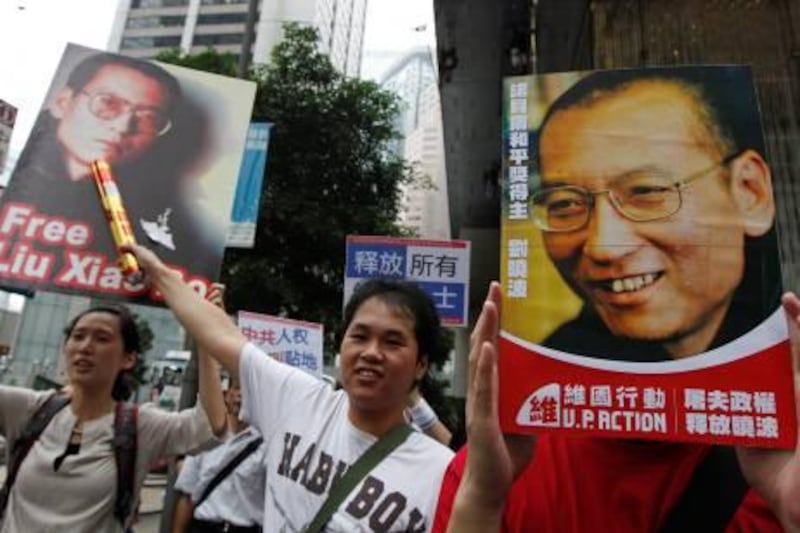BEIJING // The wife of the jailed Chinese Nobel Peace Prize winner Liu Xiaobo met her husband in a prison yesterday and said he was dedicating the award to victims of the 1989 military crackdown on reform activists. Within hours of the Nobel announcement on Friday, Liu Xia was picked up by police at her Beijing flat and taken to the jail where her husband is under detention.
Mr Liu told his wife in tears that he was dedicating the Nobel to the pro-democracy protesters killed in Tiananmen Square in 1989, both Ms Liu and a close friend of the couple wrote on their Twitter pages, the Associated Press reported. She met him yesterday, Agence France-Presse quoted the Hong Kong-based Information Centre for Human Rights and Democracy as saying. There was no immediate confirmation of the report.
The choice of Mr Liu has generated heavy coverage in many parts of the world, but analysts yesterday said the effect of the prize could be limited in China, where the state-controlled media have largely ignored the news. Although some suggested Mr Liu's calls for democratic reforms were western imports with little relevance for China, others said the secrecy surrounding the top levels of the Communist Party made it difficult to judge the extent of the leadership's appetite for reform. Mr Liu, 54, was chosen for the prize "for his long and non-violent struggle for fundamental human rights in China", the Nobel committee said in a statement.
The award was welcomed by some western governments, with the US president, Barack Obama, last year's award-winner, among those to have called for Mr Liu's release. Human rights groups such as Amnesty International said they hoped it could herald a more "transparent, democratic and participatory" political system in China. It is highly uncertain whether this will be the result, however, cautioned Chan Chepo, an assistant professor in the department of political science at Lingnan University in Hong Kong.
He said it was difficult to judge whether there was any serious desire for reform among China's top leaders. While Mr Chan said public statements from the premier, Wen Jiabao, indicated he may favour some reform, there is little sign the president, Hu Jintao, was similarly minded. Analysts have said Mr Hu, far from promoting as some expected limited political liberalisation, has been more conservative than his predecessor, Jiang Zemin. "Whether Liu Xiaobo's getting this Nobel Peace Prize will help those [among the leadership] who want political reform and whether, because of international pressure, it will help one side against the other side, it's really hard to tell," Mr Chan said.
"We really don't know much about the internal differences, how many people are on each side and who's on which side." Overall the award "won't create too much influence", according to Mr Chan. He said the question of whether the award will affect when Mr Liu is released from jail was difficult to answer, with some believing it could lead to an early release, and others thinking he may remain imprisoned for longer.
China has been highly critical of the Nobel committee's decision, describing Mr Liu as a criminal. The Chinese foreign ministry spokesman, Ma Zhaoxu, said last week his actions were "contrary to the purpose of the Nobel Peace Prize". The few mentions of the award in the Chinese press have focused on the government's hostile response to it. Mr Liu was arrested in December 2008, just before he was due to publish a document, Charter 08, that called for democratic reforms. Late last year he was sentenced to 11 years behind bars for inciting subversion of state power.
Although one of China's most famous dissidents to those living abroad, Mr Liu is little known in China itself. Chen Xin, a researcher in the Chinese Academy of Social Sciences in Beijing, said Mr Liu's calls for political reform had little relevance for the country. "Liu Xiaobo and other democratic movement leaders overseas don't fit the Chinese situation. He does not have a great influence on Chinese society and Chinese academic circles."
Most academics, Mr Chen said, think Mr Liu "too westernised" in his thinking with views that were "just a copy of the European or North American experience". Neighbouring countries such as Thailand, South Korea and Japan indicated functioning multiparty democracy was difficult to achieve in the region, Mr Chen added. Other analysts in mainland China said Liu Xiaobo was too sensitive a subject for them to comment on.






